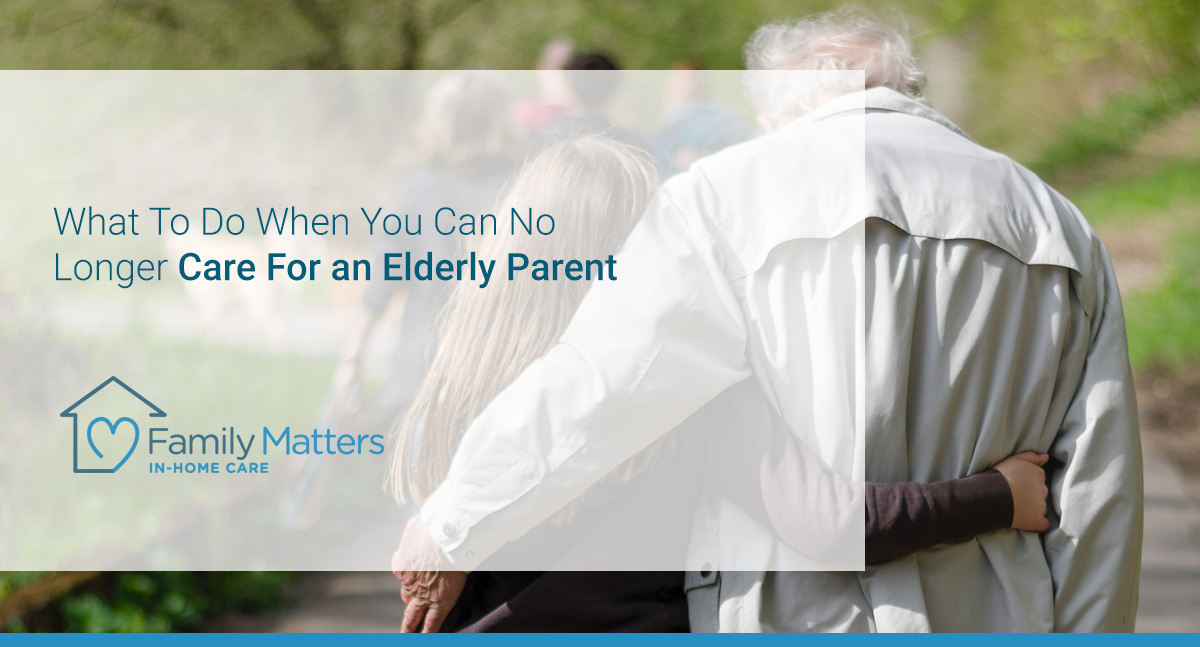
What To Do When You Can No Longer Care For an Elderly Parent
Caring for your elderly parent can be one of the hardest jobs in the world. It is a full-time commitment that often requires you to sacrifice parts of your own life. For this reason, burnout and stress are very real problems for the caregivers of elderly parents, and it is crucial to learn the signs of caregiver burnout before they occur.
So, what happens when you can no longer care for an elderly parent? Don’t worry. If that time comes, you have options. You can take some preventative measures to care for your mental health while supporting your parents.
Signs of Caregiver Burnout
Caregiver burnout refers to the feelings and symptoms you experience when you push yourself past your emotional limit. This is often the point when you can no longer care for an elderly parent because it is too exhausting. Burnout is not pleasant and can have long-lasting effects on your physical and mental health.
Some of the signs of caregiver burnout include:
- Depression
- Anxiety
- Irritability
- Feelings of resentment
- Inability to focus
- Insomnia
- Changes in appetite
- Getting physically ill often
- Aches and pains that are not from physical activity
- Loss of enjoyment of pleasurable activities
- Thoughts of harming yourself or others
Being a caregiver demands a lot from a person, and your thoughts do not make you a bad person. Please seek medical attention right away if you begin to have thoughts of hurting yourself or others.
Coping with Caregiver Burnout
You can take numerous steps to reduce your stress and exhaustion before they turn into caregiver burnout. That is not to say that you should push through burnout at all costs. Having healthy coping skills can help you evaluate whether you want to stop being a caregiver or just need more self-care.
Give Yourself Credit
Caregivers often focus so heavily on the people they care for that they forget to recognize their strengths. You are important and compassionate. Even if you don’t feel like you are doing a good job, your caregiving abilities keep your loved ones happy and healthy.
Caregiver children of elderly parents don’t usually earn any money for their time or effort. It may take a note-to-self or two to remember just how noble and essential you are. Think about it—you choose to care for your family member without any expectations in return. You deserve credit for that.
Express Your Emotions
The best way to express your feelings in a healthy way is to find an emotional outlet. Otherwise, you risk taking out your anger, frustration, stress, and sadness on the elderly person you are caring for.
An emotional outlet can be a journal, a therapist, a trusted loved one, or even physical activity. When you feel overwhelmed by your negative feelings, turn to your emotional outlet to work through and accept those emotions rather than bottling them up. Suppressing your emotions can lead to outbursts and other problems later on.
Practice Regular Self-Care
Self-care is a preventative measure to ensure you can continue coping in healthy ways. It looks different for everyone, but it’s important to practice self-care regularly, not just when you feel burnt out.
Some examples of self-care include:
- Participating in a hobby
- Pampering yourself
- Buying yourself something nice
- Exercising
- Enjoying your favorite snack or meal
- Going out with friends
- Meditating
These are just a few examples of activities that will help ward off caregiver burnout. Find something you enjoy doing and use it to your advantage.
What to Do When You Can No Longer Be a Caregiver
If you are simply too burnt out and need a change of pace, you might decide not to be your parent’s caregiver anymore. That’s okay! You are allowed to make a healthy decision for yourself without feeling guilt and shame.
So, now that you feel you’ve reached the point when you can no longer care for an elderly parent, what are the next steps? In-home care for your elderly parent is one of the best solutions. Whether your parent needs Alzheimer’s or Dementia Care or simply needs extra support navigating day to day activities, hiring a caregiver can help reduce your stress while still allowing your parent to age in place.
Giving up being a caregiver for your parent can bring up a lot of difficult emotions. Caregiver burnout is a real and valid reason to stop being your parent’s primary caregiver. You never stop loving them, but sometimes you have to pass the torch on day to day support. Finding the right support from an in-home caregiver may just be the answer.
If you or your family member is considering in-home care as part of a plan to age in place, contact Family Matters In-Home Care today for a free consultation. Our team is dedicated to supporting your family and helping older adults enjoy life in the comfort of their own home for as long as possible.
Some of the services offered by Family Matter In-Home Care include: Alzheimer’s & Dementia Care, Bed & Wheelchair Transfer Assistance, Companionship, Housekeeping & Meal Preparation, Personal Care, Recovery Care, and Transportation.
Serving the San Francisco Bay Area and Greater San Diego, Family Matter In-Home Care has offices throughout California including: Campbell, CA, Roseville, CA, San Marcos, CA, and San Mateo, CA.
